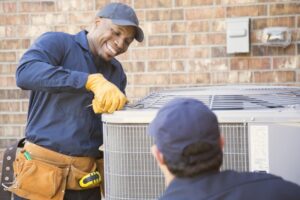
Air conditioning is supposed to make us more comfortable. Usually, it works. However, there are some times when air conditioning can lead to significant discomfort. Many people report that they experience a sore throat after spending time in an air-conditioned environment.
Can air conditioning cause a sore throat? Yes. This is usually because the air conditioning unit is not installed or operated properly. However, there are some aspects of how an air conditioner functions that contribute directly to sore throats for some people.
If you work in an office and complain to your fellow employees that air conditioning is giving you a sore throat, you might be dismissed. However, it is fairly common that people experience sore throats from spending too much time in an air-conditioned environment. This could be due to several potential causes:
We’ll talk about all of these potential causes separately.
We’ve talked extensively about how air conditioning can make you sick. Basically, air conditioners can move around the air that other people have breathed, spreading bacteria and viruses. In some cases, air conditioning can actually grow bacteria, which is why they can cause Legionnaires’ disease or Pontiac fever.
A sore throat is a common symptom of many illnesses, including several that can be spread by air conditioning.
 Another potential cause of a sore throat from air conditioning is stale air. Just like outside, indoor air can be filled with contaminants. This might be gases released by chemicals used in the office, someone’s perfume, and more. Normally, these gases don’t exist in a high enough concentration to irritate your throat, but an air conditioner can create stale air that concentrates them.
Another potential cause of a sore throat from air conditioning is stale air. Just like outside, indoor air can be filled with contaminants. This might be gases released by chemicals used in the office, someone’s perfume, and more. Normally, these gases don’t exist in a high enough concentration to irritate your throat, but an air conditioner can create stale air that concentrates them.
An air conditioner might be designed and placed so that it blows the air around in one particular area. In this part of the office, or in other parts of the office, the air might concentrate and get stale. Other times, people might close the outdoor vents of the air conditioning unit to help it cool more effectively. In either case, the stale air is full of irritants, leading to a sore throat.
An air conditioning unit can potentially clean the air. It has filters to take dust and debris from the air. However, sometimes air conditioning can blow around dirty air, leading to throat irritation.
There are several possible sources of dust and debris being blown around by your air conditioning. First, it might be the filter itself. If you don’t change or clean your filter regularly (depending on the type), you can end up with a dirty filter that is releasing dust and debris back into the air. It could also be that dust is accumulating in the air vents used by your central air conditioning system. Finally, the dust might come from the air conditioner itself, which might accumulate extensive dust and debris on the external unit or on the cooling fins.
Finally, dry air might be responsible for your sore throat. Dehumidification is usually sold as a benefit of air conditioning. Certainly, dry air can feel cooler at certain temperatures. However, if the air is too dry, it can dry out parts of our body that are supposed to stay moist. This can lead to dry-feeling nostrils or a sore throat.
The more time air conditioning runs, the drier the air can get and the likelihood of sore throats will increase.
In most cases, sore throats related to air conditioning are the result of poorly installed or maintained air conditioning units. Other times, they relate to how you use your air conditioning. Here’s how to avoid getting a sore throat from air conditioning.
 During installation, the installer should make sure that the air circulates properly through the space. If they failed to do so, you might have to work out how to improve the circulation of the air. This might be as simple as opening a window or two. Or it might require more extensive changes, including installing new vents, which can be expensive.
During installation, the installer should make sure that the air circulates properly through the space. If they failed to do so, you might have to work out how to improve the circulation of the air. This might be as simple as opening a window or two. Or it might require more extensive changes, including installing new vents, which can be expensive.
Making sure your air conditioning system gets its proper maintenance can help you avoid many causes of sore throats. This can reduce the risk of getting sick from stale water in the air conditioning and it can protect you from sickness, dust, and debris spread from dirty filters.
Cleaning and maintaining your air conditioning system is one of the most important things you can do to protect yourself from air conditioning sore throats.
Another way to protect yourself from air conditioning-related sore throats is to just not use it as much. If you’re making the air too cold, you’re also making it too dry. Turn up the thermostat to a warmer temperature or turn the unit off for short periods of time to let the air return to a more normal humidity. You can even try humidifying the air with a mister or other system, but this obviously conflicts with the function of the air conditioner and can lead to overflowing reservoirs.
Most air conditioning is designed to be able to take air from outside as well as from inside. Often, the outdoor vent is closed to make the air conditioner more efficient and effective. However, getting some fresh air from outside can help you avoid problems with stale and over-dry air.
Part of the problem with air conditioning is that many people spend their entire day in an air-conditioned environment. This is what causes your throat to get dry and irritated. If you can’t control the temperature of the air conditioning or turn it off sometimes, then you just have to get outside to breathe some fresh air.
Of course, if air conditioning is giving you a sore throat, maybe it’s time to find a different cooling solution. If dry, stale air from air conditioning is causing you to get a sore throat, then maybe you should consider using an evaporative cooler. Evaporative coolers draw air from outside so you always have a fresh air supply. In addition, they add moisture to the air so you won’t end up with air that’s too dry.
If you want to learn whether a Portacool evaporative cooler might be the better cooling solution for you, visit a local or online retailer. Have specific questions about our evaporative coolers or want to put in a large order? Please contact us directly.